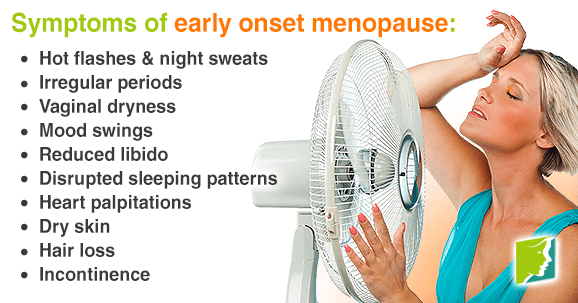Perimenopause, the stage where the body prepares itself for menopause, is also when menopausal symptoms begin to appear. In some cases, these symptoms can begin 10 to 15 years before menopause occurs. Most women go through menopause in their late 40s and early 50s. In early menopause, these symptoms may appear at a much younger age.
It's important to recognize and understand early menopause symptoms so that you can effectively recognize and deal with them. Keep reading to find out more about early onset menopause symptoms and why they occur.
Am I Experiencing Early Onset of Menopause?
Early onset menopause usually begins while a woman is still having periods. Hormonal fluctuations cause symptoms, which vary in frequency and intensity. Many women experience these symptoms before the age of 40, and wonder if they're signs of early menopause. Perimenopause can last anywhere from a few months to up to ten years, with the average being four years. Many symptoms will decrease after perimenopause, although some women report that some of their symptoms persisted well after the menopause transition has ended.
If you are experiencing menopausal symptoms and under 40, it is always a good idea to go talk to your doctor. He or she will be able to confirm whether you are experiencing early menopause or something else, such as polycystic ovary syndrome (PCOS) or thyroid problems.
What Causes the Symptoms of Early Menopause?
Early onset menopause symptoms are caused by fluctuating estrogen and progesterone levels. During perimenopause and menopause, the ovaries produce different amounts of the hormones estrogen and progesterone, which control menstruation and ovulation as well as many other things. Fluctuating hormone levels can cause a variety of symptoms.
What Are the Most Common Symptoms?
There are a vast range of symptoms and every woman's experience of menopause is different. However, some menopause symptoms are more widespread than others, such as:
Hot flashes. The most common menopausal symptom, it occurs when fluctuating hormone levels cause your body to become confused about its own temperature. Thinking it's too cold, it ups the heat.
Night sweats. These are hot flashes that occur at night. Since you are sleeping when they occur, often your body realizes that it's overheating, and starts sweating profusely to try and cool down.
Sleep irregularities. Insomnia, fatigue, and interrupted sleep may become more common problems.
Irregular periods. A classic sign of menopause that all women go through. Periods may be heavier or lighter, and the duration and length between them may also change.
Vaginal dryness. This can make sex difficult or uncomfortable.
Mood swings. It's not uncommon to suddenly start having problems with depression, anxiety, or fatigue. Rapidly changing hormone levels may cause your mood to change quickly, which can be disorienting.
Click the following link to learn more about common treatments for early menopause.
Sources
- National Health Service.(n.d).Menopause Symptoms. Retrieved August 5, 2015 from http://www.nhs.uk/Conditions/Menopause/Pages/Symptoms.aspx




